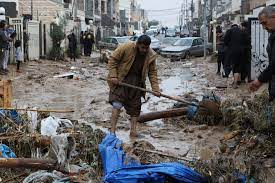- February 7, 2022
- Posted by: strategia
- Category: Humanitarian News

“We had to use four layers of clothes so that children would stay warm during the night,” Mizgeen, a Syrian refugee living in Domiz camp, the largest refugee camp in the Kurdistan Region of Iraq (KRI), recounts as he fills his jerrican with fuel to heat his shelter.
“Fuel is expensive, and whatever cash I received from UNHCR, the UN Refugee Agency, it is barely enough to buy fuel. It will not last long enough for the entire winter,” Mizgeen adds.
Unprecedented heavy rains and snow not witnessed in over 40 years fell in the KRI in the last few weeks, with extreme subzero temperatures reaching minus eight Celsius. The extreme weather caused schools to close, blocked roads and caused damage to exposed shelters where refugees and internally displaced people (IDP) live.
For many refugees like Mizgeen or Iraqi citizens displaced by the 2014-17 violence by the Islamic State in Iraq, the extreme cold coupled with a shortage of fuel for heating was devastating. Many still live under tents or in temporary shelters in camps or villages that are not adequate for such weather conditions.
Hadiya was displaced in 2014, from Anbar governorate and now lives on the outskirts of Erbil after having lost her husband in the conflict seven years ago. A widow with four children, she never experienced such extreme cold: “What we need is heating throughout the day and night, but what we can afford is only six or seven hours of heating per day.”
Hadiya makes bread at home and sells it in her neighbourhood to make ends meet. “I am glad that I received cash assistance to help me buy fuel for heating; otherwise, my children would have been sick because of the cold weather”, she added.
Many Syrian and other refugees as well as displaced Iraqis lost their jobs due to lockdowns and the slowing down of the economy due to the pandemic. Work is scarce during the winter anyway, as most work as daily labourers on construction sites or in agricultural fields.
In Erbil, Hala, a widow in Baharka IDP camp, keeps praying to God that nothing will happen to her seven grandchildren who are left to her care as their parents disappeared during the conflict: “Now I only have God and this sim card that brings me assistance”. UNHCR, through cash agents, distributes cash assistance directly to refugees and displaced Iraqis through their mobile telephone e-wallets. This allows them to go to nearest cash point and receive cash that they can then use as they see fit to meet their most pressing needs.
UNHCR and partners and since last November have started to distribute winter cash assistance to vulnerable displaced families. As the UNHCR Head of Office in Sulaymaniyah, Bola Han, confessed: “At least, because we had distributed our cash assistance before the storm, these families were able to buy fuel for heating or warm clothes for their children before they got hit by the very bad weather.”
This winter, over 546,000 individuals (refugees and IDPS) were targeted to receive cash assistance in Iraq. UNHCR wishes to thank the following donor countries: Canada, Czech Republic, France, Germany, Luxembourg, Republic of Korea, Sweden, Switzerland and USA, who provided us with un-earmarked flexible funding that allows us to use the funds immediately when and where they are needed the most.

